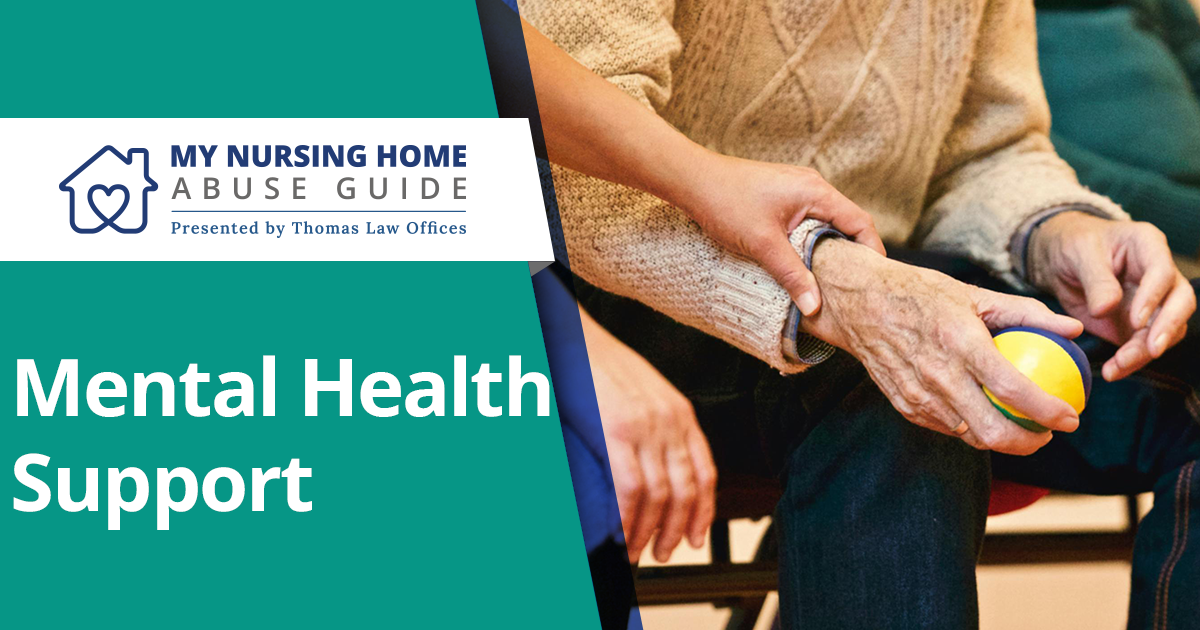Your Guide to Nursing Home Abuse & Prevention
Millions of elderly adults live in nursing home facilities.
Every one of them deserves to feel safe, protected, and respected.
Millions of elderly adults live in nursing home facilities.
Every one of them deserves to feel safe, protected, and respected.

Nursing home abuse is the mistreatment of vulnerable individuals in a nursing home setting. Abuse can be physical, emotional, sexual, or financial. Each instance makes a psychological impact on the victims.
For example, physical abuse can lead to anxiety and fear, while emotional abuse can result in depression and low self-esteem. Sexual abuse can cause post-traumatic stress disorder (PTSD), and financial abuse can lead to stress and worry about financial security. All of these cases can have a significant effect on the mental health of survivors.
After someone has suffered abuse, mental health support is important to help in recovery. With treatment, these survivors can regain their sense of dignity and self-worth.
Unfortunately, there is still a stigma surrounding mental health and treatment. No matter the circumstances, these individuals deserve support to help them overcome the trauma.
Survivors of nursing home abuse can benefit from a few types of support options. In some cases, these victims feel more comfortable in an individual setting.
One type of therapy that can assist is cognitive-behavioral therapy (CBT). According to its principles, feelings, thoughts, and behaviors are connected. Nursing home abuse survivors may have developed negative thought patterns. In turn, that can increase their feelings of shame, guilt, or fear.
By using CBT techniques, survivors can replace those negative connotations with healthier ones.
Often, this therapy will require several stages, such as recognizing, understanding, and re-evaluating these behaviors. These individuals can also create better coping strategies to handle any future situations.
However, CBT is not the only type of individual therapy option. Some treatments focus on the trauma, helping survivors process it. Trauma-focused therapy addresses the psychological and emotional effects of the abuse. When these individuals can fully understand the impact of the event, then they can develop better effective coping mechanisms.
Still, some survivors might feel uncomfortable in an individual setting. In those cases, there are group options.
These groups provide survivors with a safe and supportive environment to share their experiences and feelings. Any abuse can make individuals feel isolated.
By sharing their experiences in a group setting, these residents can learn better coping strategies and get advice on how to move forward with these types of abuse. This type of therapy often gives survivors a sense of empowerment.
A comprehensive mental health treatment plan might include the use of medications. Antidepressants can help manage symptoms of depression and anxiety, while certain types of medication can help reduce symptoms of PTSD.
Holistic approaches can treat the whole person, not just the symptoms of a disorder. Mindfulness practices, such as meditation and deep breathing exercises, can help survivors stay focused on the present moment and reduce feelings of anxiety and stress.
Yoga can improve physical strength and flexibility, relieve stress, and promote relaxation. Other holistic approaches may include art, music, and animal-assisted therapy.
Family members play a vital role in supporting survivors of nursing home abuse. If you have a family member who has experienced abuse, you want to provide them with plenty of patience and encouragement during the recovery process.
After the traumatic experience of surviving nursing home abuse, some individuals may be reluctant to seek help. Fortunately, there are many available resources to help you find the help you need for your loved one.
You may want to reach out to local support groups or even national programs, such as the Long-Term Ombudsman Program.
No matter the situation, no one should suffer in silence.
To help assist in mental health recovery, here are a few resources to help your loved one receive mental health help to cope with their experiences.
Mental health support is vital for survivors of nursing home abuse. Increased awareness, resources, and research are needed to ensure every survivor can access the help they need.
It is up to everyone to prevent nursing home abuse, but more importantly, support those who have survived it. You can access our other resources here.
This website was created and is maintained by the legal team at Thomas Law Offices. Our attorneys are experienced in a wide variety of nursing home abuse and neglect cases and represent clients on a nationwide level. Call us or fill out the form to the right to tell us about your potential case. We will get back to you as quickly as possible.
866-351-2504